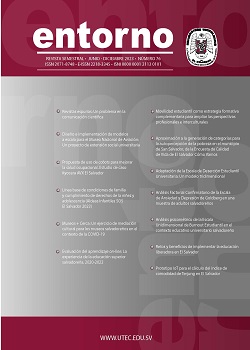Adaptation of the University Student Dropout Scale: A Three-dimensional Model
Published 2024-06-18
Keywords
- University dropouts - Central America,
- Higher education – Central America,
- University students – Central America – Economic conditions,
- Education – social aspects
Copyright (c) 2023 Universidad Tecnológica de El Salvador

This work is licensed under a Creative Commons Attribution-NonCommercial-ShareAlike 4.0 International License.
How to Cite
Abstract
University student dropout is a phenomenon that affects both the student himself and the university institution and society. However, it is necessary to have instruments that adequately determine the possible factors that may cause the student to make the decision to abandon their studies totally or partially. Although in El Salvador there is an instrument to measure this phenomenon, it is necessary to update it. Therefore, the purpose of the instrumental study with a retrospective design is to verify if the University Student Dropout Scale can be used through a three-dimensional model. The sample is made up of 1222 students who dropped out of their university studies. The mean age was 26.46 years with a standard deviation of 6.40. The results indicated that the three-dimensional model of the University Student Dropout Scale has adequate construct validity and reliability rates. Likewise, a scale is proposed to detect the possible reasons why the students decided to abandon their studies. It is concluded that the three-dimensional version of the University Student Dropout Scale is a valid and reliable instrument to be used in the Salvadoran context and in other international educational contexts. It is recommended that the scale undergo psychometric testing in other countries.

